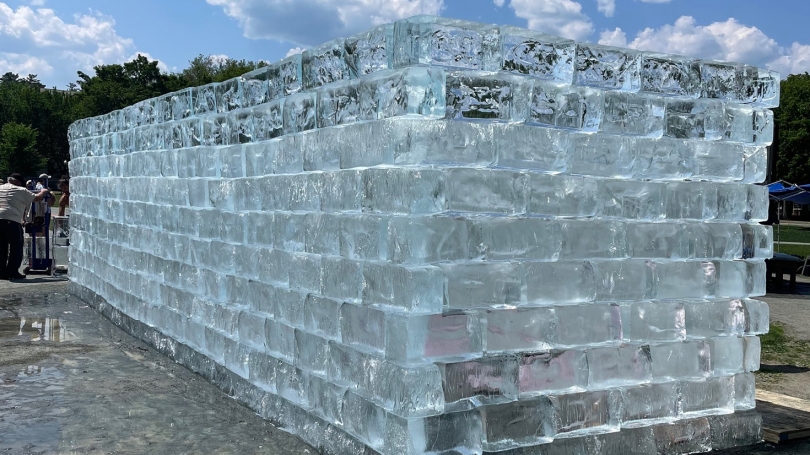
- Undergraduate
- Foreign Study
- Careers & Opportunities
- News & Events
- People
Back to Top Nav
Back to Top Nav
Back to Top Nav
On June 1, art history students and volunteers from the community will recreate Allan Kaprow's 1967 work Fluids by building a giant ice sculpture on the Green.
There's nothing like an ambitious group art project to foster a sense of community and connectedness.
That was part of Professor Katie Hornstein's inspiration for asking her art history senior seminar students to reinvent Fluids (1967), an immersive experience created by conceptual artist Allan Kaprow. Kaprow's original project—which he called a "happening"—involved inviting groups of local Los Angeles residents to build three large, enclosed structures out of blocks of ice as part of a midcareer retrospective for the Pasadena Art Museum. The ice structures were then left to melt.
"Kaprow was one of many artists who was interested in finding out how seemingly non-artistic material and ways of being might, under the right circumstances, take on what he called 'an aesthetic charge,'" explains Hornstein, an associate professor of art history and chair of the department. "Kaprow and other artists of his generation also challenged the traditional idea of what an 'art object' might be—that is, not something that we admire on a wall in a state of reverential aesthetic contemplation, but as something that you experience."
Hornstein's senior seminar will recreate Fluids by recruiting local community volunteers to build one ice structure on the Dartmouth Green beginning at 11 a.m. on June 1. The project will offer students opportunities for community-building and risk-taking through the labor of group building—which also demands intensive planning and archival research—and through campus-wide programming that students have planned around the structure as it melts.
Fluids will allow students to "enact some of the complex ideas of the avant-garde and the practice of forging collectivity through the act of building something together," says Hornstein. Additionally, she says, the ephemeral nature of the structure serves as an "implicit critique of consumerism" because "there's no end product to buy and sell."
The class is collaborating with Murray Long, an ice sculptor from the Seacoast of New Hampshire, who will be on the Green all day on June 1 unloading the giant blocks of ice and getting them ready to be picked and stacked. Additionally, Jim Alberghini from Conferences and Events and Mark Ewing from Facilities Operations and Management are providing logistics support. The event is cosponsored by DCAL, the Leslie Center for the Humanities, the Hood Museum of Art, and the Department of Art History.
"While we all personally want to complete the entire sculpture, it is not the main goal," says seminar student Sam Zuniga '23. "Rather, this piece of art is about the process of organizing and experiencing this 'happening.'"
In fact, Zuniga says he's most excited to learn about communal project management; the biggest challenge so far has been coordinating and plotting out how to train volunteers. "As opposed to other reinventions of Fluids, we are using a volunteer system to augment our own work, and this requires training and best using that volunteer base," he says.
Hornstein stresses that the goal of Fluids is to engage not just her seminar students, but the broader Dartmouth community
"The work of art encompasses both the building of the structure and the witnessing of its construction and melting, which is open to everyone," she says. "I anticipate that Fluids will animate discussions about the Anthropocene, late-stage capitalism, questions of labor and collectivity, and the viability of avant-garde strategies in our contemporary moment."
Zuniga points out that while there will be literal and physical exertion involved, Fluids is also intended to entertain and delight.
"As we have learned in class from Kaprow's philosophical and theoretical writings on 'happenings,' there is a part of this that engages in 'intentional play,' where there should be an element of playfulness within an otherwise serious, labor-intensive project environment," he says. "I am excited to have fun."
Interested in taking part in this project as a volunteer? Email art.in.life.2023@gmail.com to receive the sign-up link.